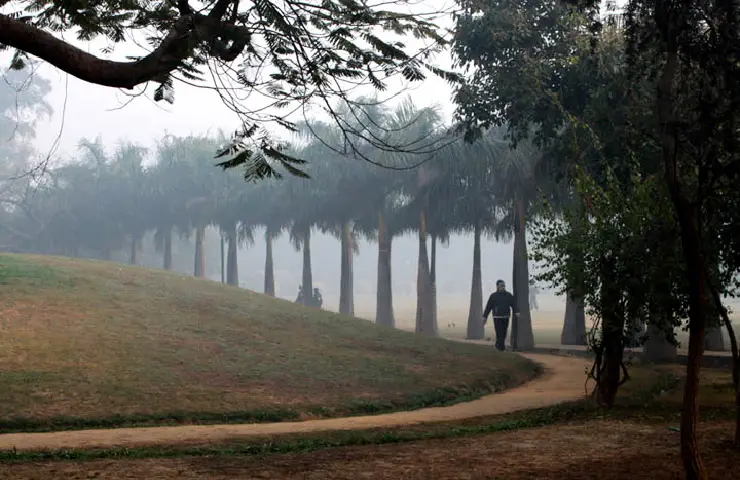

A park in New Delhi (Photo: Rahul Kumar)
<p>
On Wednesday, the World Health Organisation (WHO) tightened its guidelines for air pollution. This means that for many cities, the air pollution measurement levels are now higher than what they were till a day earlier.<br />
<br />
<a href="https://www.who.int/news-room/fact-sheets/detail/ambient-(outdoor)-air-quality-and-health">WHO has revised the Global Air Quality Guidelines </a>(AQGs), after almost 12 years. The underlying reason for making these stringent is that WHO says poor quality air kills people and affects health adversely.</p>
<p>
WHO said that of all environmental problems, air pollution is one that poses the biggest risks to health. &quot;By reducing air pollution levels, countries can reduce the burden of disease from stroke, heart disease, lung cancer, and both chronic and acute respiratory diseases, including asthma&quot;.<br />
<br />
It added that lower levels of air pollution also mean better cardiovascular and respiratory health.<br />
<br />
The WHO said: &quot;Air pollution is one of the biggest environmental threats to human health, alongside climate change. Improving air quality can enhance climate change mitigation efforts, while reducing emissions will in turn improve air quality. By striving to achieve these guideline levels, countries will be both protecting health as well as mitigating global climate change&quot;.<br />
<br />
The revised guidelines mean that 90 per cent of the world and almost all people in South Asia breathe air that is below WHO recommendations.</p>
<ul>
<li>
Under the revised Global Air Quality Guidelines (AQGs), the level of pollutant PM2.5 has been reduced to 5 from the previous 10 in 2005.</li>
<li>
Similarly, pollutant PM10 has been reduced to 15 from the previous 20.</li>
<li>
Amounts reduced for Ozone (O3), Nitrogen Dioxide (NO2), Sulphur Dioxide (SO2) and Carbon Monoxide (CO) as compared to the previous levels.</li>
</ul>
<p>
WHO indulged in a global exercise to frame the new guidelines. It finds that almost all of South Asia and South-East Asia need stringent measures to improve the quality of their air.<br />
<br />
Highlighting how bad air impacts the poorest people, WHO Director-General, Tedros Adhanom Ghebreyesus said &quot;Air pollution is a threat to health in all countries, but it hits people in low and middle-income countries the hardest&quot;.</p>
<p>
Talking about the WHO recommendations, Arvind Kumar, Founder, Lung Care Foundation, said: &quot;This is a public health emergency, affecting the lives of people all over the world, with the worst impacts in South Asia. Governments across South Asian countries need to urgently align their national air quality standards with the latest WHO guidelines&quot;.</p>
<p>
<a href="https://www.indianarrative.com/science-news/taiwan-opts-for-azure-fighters-floating-vacuum-machines-to-clean-up-its-waters-115778.html"><strong>Taiwan opts for Azure Fighters &ndash; floating vacuum machines to clean up its waters</strong></a></p>
<p>
<a href="https://www.indianarrative.com/science-news/climate-change-could-force-migration-of-million-people-world-bank-114797.html"><strong>Climate change could force migration of 216 million people: World Bank</strong></a></p>
<p>
<a href="https://www.indianarrative.com/science-news/climate-change-could-force-migration-of-million-people-world-bank-114797.html"><br />
</a></p>
The human rights organisation of the Baloch National Movement (BNM), Paank, has published its most…
The Israel Defence Forces (IDF) on Tuesday claimed that it has killed Iran's senior-most military…
Amid escalating conflict between Iran and Israel, the Ministry of External Affairs (MEA) on Tuesday…
Amid the escalating tensions between Israel and Iran, Indian Embassy in Iran has asked all…
Ahead of the critical G7 Summit meeting in Canada, leaders of the forum have issued…
India's trade performance in May 2025 has shown strength and stability, despite uncertain global conditions,…